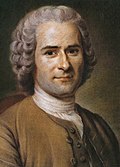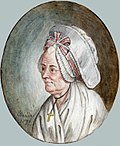Jean-Jacques Rousseau
Jean-Jacques Rousseau (28 June 1712 – 2 July 1778) was a Genevan philosopher, writer, and composer. His political philosophy influenced the French Revolution and the development of liberal, conservative, and socialist theory. His works also impacted the growth of romanticism in literature and the arts.
Early Life[edit]
Rousseau was born in Geneva, which was at the time a city-state and a Protestant associate of the Swiss Confederacy. His mother, Suzanne Bernard Rousseau, died of puerperal fever nine days after his birth, which he later described as "the first of my misfortunes". He was raised by his father, Isaac Rousseau, a watchmaker, with whom he read avidly.
Career[edit]
Rousseau's most significant work, The Social Contract, outlines the basis for a legitimate political order within a framework of classical republicanism. His philosophy of education, expressed in his treatise Emile, or On Education, emphasizes the importance of expression rather than repression to produce a well-balanced, freethinking child. He expounded a new theory of art in The New Heloise, which influenced the development of romanticism in literature and the arts.
Health and Death[edit]
Rousseau suffered from several health problems throughout his life, including depression, urinary difficulties, gastrointestinal disease, and stroke. He died on 2 July 1778 from what appears to have been a sudden stroke.
Legacy[edit]
Rousseau's ideas have significantly influenced political and social thought. His work continues to be studied by scholars and students in the fields of philosophy, sociology, education, political science, and literature.
This article is a philosophy-related stub. You can help WikiMD by expanding it!
-
Jean-Jacques Rousseau
-
Jean-Jacques Rousseau
-
Jean-Jacques Rousseau
-
Jean-Jacques Rousseau
-
Jean-Jacques Rousseau
-
Jean-Jacques Rousseau
-
Jean-Jacques Rousseau
-
Jean-Jacques Rousseau
-
Jean-Jacques Rousseau
-
Jean-Jacques Rousseau
-
Jean-Jacques Rousseau
-
Jean-Jacques Rousseau
Ad. Transform your life with W8MD's Budget GLP-1 injections from $75


W8MD offers a medical weight loss program to lose weight in Philadelphia. Our physician-supervised medical weight loss provides:
- Weight loss injections in NYC (generic and brand names):
- Zepbound / Mounjaro, Wegovy / Ozempic, Saxenda
- Most insurances accepted or discounted self-pay rates. We will obtain insurance prior authorizations if needed.
- Generic GLP1 weight loss injections from $75 for the starting dose.
- Also offer prescription weight loss medications including Phentermine, Qsymia, Diethylpropion, Contrave etc.
NYC weight loss doctor appointmentsNYC weight loss doctor appointments
Start your NYC weight loss journey today at our NYC medical weight loss and Philadelphia medical weight loss clinics.
- Call 718-946-5500 to lose weight in NYC or for medical weight loss in Philadelphia 215-676-2334.
- Tags:NYC medical weight loss, Philadelphia lose weight Zepbound NYC, Budget GLP1 weight loss injections, Wegovy Philadelphia, Wegovy NYC, Philadelphia medical weight loss, Brookly weight loss and Wegovy NYC
|
WikiMD's Wellness Encyclopedia |
| Let Food Be Thy Medicine Medicine Thy Food - Hippocrates |
Medical Disclaimer: WikiMD is not a substitute for professional medical advice. The information on WikiMD is provided as an information resource only, may be incorrect, outdated or misleading, and is not to be used or relied on for any diagnostic or treatment purposes. Please consult your health care provider before making any healthcare decisions or for guidance about a specific medical condition. WikiMD expressly disclaims responsibility, and shall have no liability, for any damages, loss, injury, or liability whatsoever suffered as a result of your reliance on the information contained in this site. By visiting this site you agree to the foregoing terms and conditions, which may from time to time be changed or supplemented by WikiMD. If you do not agree to the foregoing terms and conditions, you should not enter or use this site. See full disclaimer.
Credits:Most images are courtesy of Wikimedia commons, and templates, categories Wikipedia, licensed under CC BY SA or similar.
Translate this page: - East Asian
中文,
日本,
한국어,
South Asian
हिन्दी,
தமிழ்,
తెలుగు,
Urdu,
ಕನ್ನಡ,
Southeast Asian
Indonesian,
Vietnamese,
Thai,
မြန်မာဘာသာ,
বাংলা
European
español,
Deutsch,
français,
Greek,
português do Brasil,
polski,
română,
русский,
Nederlands,
norsk,
svenska,
suomi,
Italian
Middle Eastern & African
عربى,
Turkish,
Persian,
Hebrew,
Afrikaans,
isiZulu,
Kiswahili,
Other
Bulgarian,
Hungarian,
Czech,
Swedish,
മലയാളം,
मराठी,
ਪੰਜਾਬੀ,
ગુજરાતી,
Portuguese,
Ukrainian








